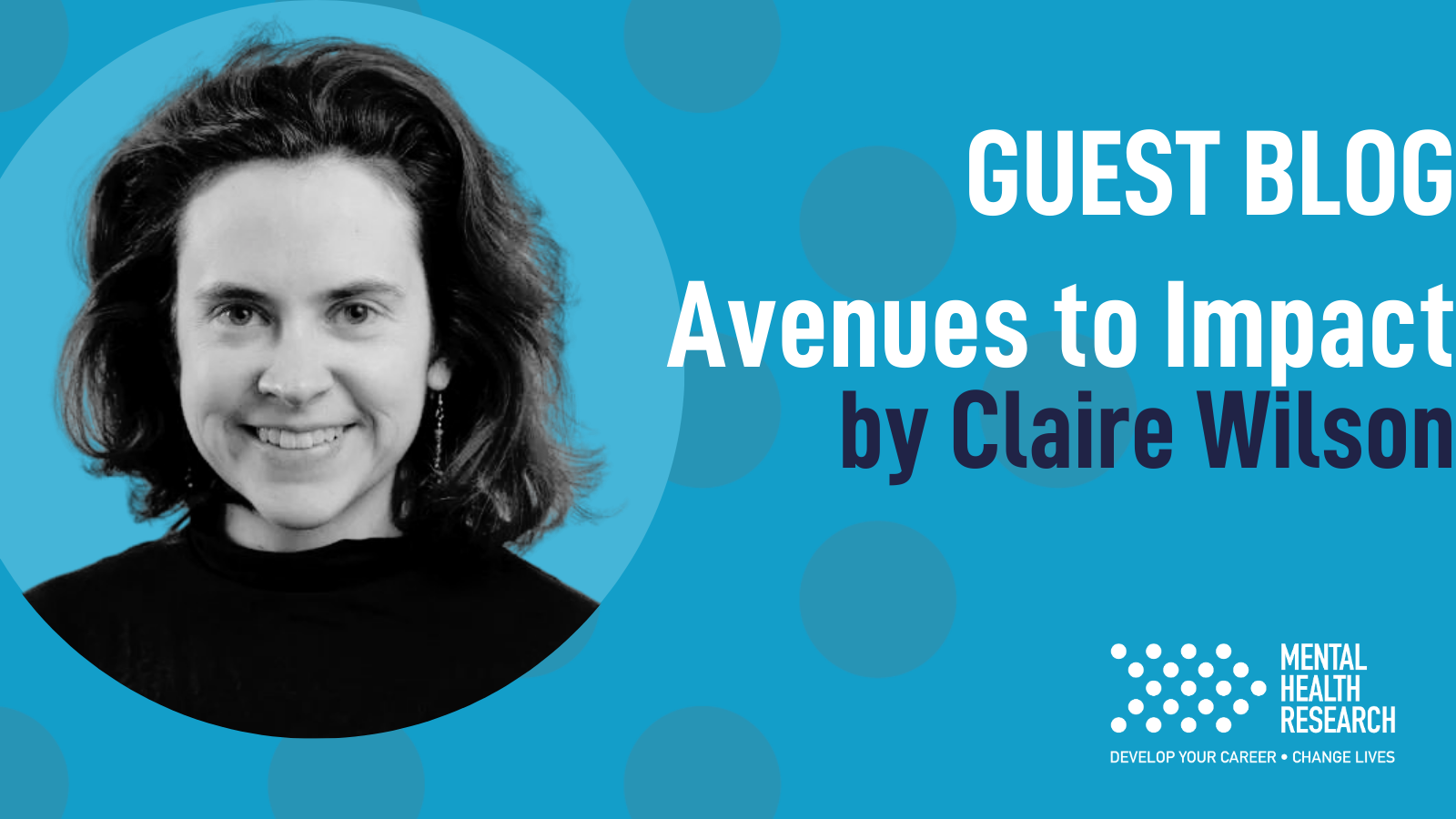
In our latest guest blog we have a piece by steering committee member Dr. Claire Wilson, a psychiatrist and academic at Kings College London. Claire is writing about how her range of clinical, research and policy experience are leading to impactful work in mental health.
I am a psychiatrist and researcher. My area of interest is in the intergenerational transmission of mental ill health. The broad range of socioenvironmental determinants of health dictate that working together with those from a range of disciplines who can impact a wide range of aspects of wellbeing is critical. Moreover, strong relationships between researchers, policymakers and other stakeholders are critical to effective knowledge translation and to fully realising impact, which is fast becoming a key academic performance metric.
It was only several years later, after the findings had been published, that I learned that my findings had been used to influence health visiting policy in Scotland…..and I had thought statistical significance was thrilling!
I consider myself very fortunate that the first piece of research on which I embarked had impact, at least according to my (perhaps somewhat biased) Professor at the time. I was a medical student and had been sent away to play with a dataset relating to the evaluation of a health visiting intervention among families with pre-school children. I found, to my surprise, that I really enjoyed playing with data, designing analysis plans to answer research questions, and above all, of course, the thrill of the statistically significant findings! It was only several years later, after the findings had been published, that I learned that my findings had been used to influence health visiting policy in Scotland… and I had thought statistical significance was thrilling! It dawned on me that a future career as a clinical academic really could make a difference at individual patient and population levels.
Thus ensued a desire throughout my clinical academic journey to also develop my skills in translation of my work to policymakers. As a medical student, I interned at the World Health Organisation (WHO). While working in the Mental Health and Substance Misuse division, I wrote a number of policy documents. I gained an insight into the priorities of policy makers, often very different from that of academics.
After undertaking an NIHR-funded Academic Clinical Fellowship as a psychiatry trainee at the Institute of Psychiatry, Psychology and Neuroscience, King’s College London, I embarked on a PhD in psychiatric epidemiology, funded by the Medical Research Council (MRC). As a result of being funded by the MRC, I was able to undertake a three month internship at the UK Parliamentary Office of Science and Technology (POST). By engaging relevant stakeholders and reviewing the published literature, I wrote a policy briefing for parliamentarians on the impact of COVID-19 on healthcare staff. I gained skills in engaging policy makers, including how to translate research findings and communicate them clearly and impartially.
Having recently completed my higher psychiatry training as an NIHR Academic Clinical Lecturer, I am now undertaking a Harkness Fellowship, funded by the Commonwealth Fund. I am based at Columbia University in the US and will be exploring racial inequalities in maternal mental health. This will provide further opportunities to expand my knowledge of international health policy, of the pathways to knowledge translation and subsequent population-level impact.
The project highlighted to me the power of involving those with lived experience in research to illuminate new and unexplored avenues for investigation
However, impact is clearly not solely about impacting policy makers. It is about impacting a range of stakeholders, including patients and the public. Many of us are now accustomed to patient and public involvement and engagement in our research and it is a practice that I have found enjoyable and helpful, albeit there is an ongoing challenge in ensuring that it is meaningful and representative of a broad range of stakeholders.
The highlight of my MRC-funded PhD fellowship was a public engagement project, in which I commissioned two artists to produce a short film about the experiences of those with gestational diabetes (the mental health impacts of which I had studied in my PhD). I was working closely with patient advocacy groups, a broad range of those who had experienced gestational diabetes were involved in the film, which has been viewed by many clinicians, researchers, patients and the public throughout the UK and internationally. The project was a lot of fun! The chance to work with artists completely outside my discipline challenged the existing paradigms in which I think and through which I view research. The project highlighted to me the power of involving those with lived experience in research to illuminate new and unexplored avenues for investigation. Above all, it provided another pathway to impact.
There are many avenues to impact. Herein I have described just a few that I have been fortunate to pursue. I look forward to continuing on this journey during this year as a Harkness Fellow and beyond, as I commence my NIHR Advanced Fellowship in 2024.
The Harkness Fellowships are currently open to applications for 2024-2025 until November 1st. If you are thinking about applying and want to know more about the requirements/process, have a look at their website here.
Do you have experience of working in mental health policy, or working in research abroad? We would love to hear from you on Twitter @MHRIncubator
